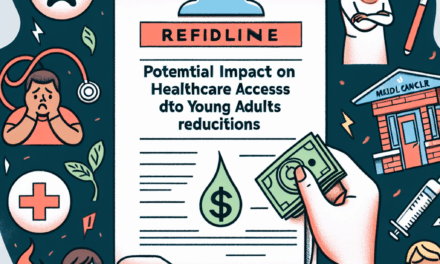Amwell Divests Virtual Psychiatric Care Unit to Avel eCare for $21 Million
The healthcare landscape is rapidly evolving, particularly in the realm of telehealth and virtual care. One of the most significant recent developments in this space is Amwell’s decision to divest its Virtual Psychiatric Care Unit to Avel eCare for $21 million. This strategic move has implications not only for the companies involved but also for the broader telehealth industry and the future of mental health care delivery. In this article, we will explore the reasons behind this divestiture, the implications for both Amwell and Avel eCare, the current state of virtual psychiatric care, and what this means for patients and providers alike.
Understanding the Divestiture: Reasons and Implications
Divestitures are often strategic decisions made by companies to streamline operations, focus on core competencies, or respond to market changes. In the case of Amwell, the decision to divest its Virtual Psychiatric Care Unit can be understood through several lenses.
1. Strategic Focus on Core Competencies
Amwell, a leader in telehealth services, has been focusing on expanding its core offerings in primary care and chronic disease management. By divesting its Virtual Psychiatric Care Unit, Amwell can concentrate its resources and efforts on areas where it has established expertise and market presence.
- Resource Allocation: The divestiture allows Amwell to allocate resources more effectively, investing in technologies and services that align with its strategic goals.
- Market Positioning: By focusing on primary care and chronic disease management, Amwell can strengthen its position in these growing markets, which are increasingly important in the post-pandemic healthcare landscape.
2. Financial Considerations
The $21 million price tag for the divestiture reflects not only the value of the Virtual Psychiatric Care Unit but also Amwell’s need to improve its financial standing. The telehealth industry has faced significant challenges, including increased competition and changing reimbursement models.
- Revenue Generation: The sale provides Amwell with immediate capital that can be reinvested into its core business or used to pay down debt.
- Cost Management: By divesting a unit that may not align with its long-term strategy, Amwell can reduce operational costs associated with maintaining the psychiatric care services.
3. Market Dynamics and Competition
The telehealth market is becoming increasingly competitive, with numerous players vying for market share. Amwell’s decision to divest its Virtual Psychiatric Care Unit may also be a response to these dynamics.
- Increased Competition: The rise of specialized telehealth providers focusing solely on mental health services has intensified competition, making it challenging for Amwell to maintain its market share in this area.
- Partnership Opportunities: By divesting, Amwell may open the door for potential partnerships with other companies that specialize in mental health, allowing for a more integrated approach to care.
4. Regulatory and Compliance Challenges
The mental health sector is heavily regulated, and compliance with various laws and regulations can be complex and costly. Amwell’s divestiture may also be influenced by these challenges.
- Compliance Costs: Maintaining compliance with mental health regulations can be resource-intensive, and divesting the unit may alleviate some of these burdens.
- Focus on Telehealth Regulations: By focusing on primary care, Amwell can concentrate on navigating the regulatory landscape specific to that area, which may be less complex than mental health regulations.
5. Future Outlook for Amwell
Looking ahead, Amwell’s divestiture of its Virtual Psychiatric Care Unit may position the company for future growth and success in its core areas. The decision reflects a strategic pivot that could yield positive results in the long run.
- Innovation in Primary Care: With the capital gained from the divestiture, Amwell can invest in innovative technologies and services that enhance its primary care offerings.
- Market Adaptation: The ability to adapt to changing market conditions will be crucial for Amwell’s success, and this divestiture may be a step in the right direction.
Avel eCare: A New Player in Virtual Psychiatric Care
Avel eCare, a subsidiary of Avel, is poised to take over Amwell’s Virtual Psychiatric Care Unit, marking a significant expansion of its services. This acquisition aligns with Avel eCare’s mission to provide comprehensive telehealth solutions, particularly in the mental health space.
1. Avel eCare’s Mission and Vision
Avel eCare aims to enhance access to healthcare services through innovative telehealth solutions. The acquisition of Amwell’s Virtual Psychiatric Care Unit is a strategic move that aligns with its mission to provide high-quality mental health care to underserved populations.
- Access to Care: Avel eCare is committed to improving access to mental health services, particularly in rural and underserved areas where traditional psychiatric care may be limited.
- Integrated Care Model: The company aims to integrate mental health services with primary care, recognizing the importance of addressing both physical and mental health needs.
2. Enhancing Service Offerings
The acquisition of Amwell’s Virtual Psychiatric Care Unit allows Avel eCare to enhance its service offerings significantly. This expansion will enable the company to provide a more comprehensive range of mental health services.
- Expanded Provider Network: Avel eCare can leverage Amwell’s existing network of mental health professionals to expand its reach and improve service delivery.
- Innovative Care Models: The integration of Amwell’s virtual care technologies will allow Avel eCare to implement innovative care models that improve patient outcomes.
3. Addressing Mental Health Needs
The COVID-19 pandemic has exacerbated mental health issues across the globe, leading to increased demand for mental health services. Avel eCare’s acquisition of the Virtual Psychiatric Care Unit positions it to address these growing needs effectively.
- Increased Demand: The pandemic has led to a surge in mental health issues, making it imperative for providers to expand their services to meet this demand.
- Telehealth as a Solution: Avel eCare recognizes the potential of telehealth to bridge the gap in mental health care access, particularly for those who may be hesitant to seek in-person treatment.
4. Financial Implications for Avel eCare
The $21 million investment in Amwell’s Virtual Psychiatric Care Unit represents a significant financial commitment for Avel eCare. However, this investment is expected to yield substantial returns in the long run.
- Revenue Growth: By expanding its mental health services, Avel eCare can tap into a growing market, potentially increasing its revenue streams.
- Cost Efficiency: The integration of Amwell’s technologies may lead to cost efficiencies in service delivery, ultimately benefiting the company’s bottom line.
5. Future Prospects for Avel eCare
The acquisition of Amwell’s Virtual Psychiatric Care Unit positions Avel eCare for future growth and success in the telehealth space. The company is well-positioned to capitalize on the increasing demand for mental health services.
- Market Expansion: Avel eCare can expand its market presence by offering a comprehensive suite of mental health services, attracting new patients and providers.
- Innovation and Technology: The integration of advanced telehealth technologies will enable Avel eCare to stay competitive in a rapidly evolving market.
The Current State of Virtual Psychiatric Care
The landscape of virtual psychiatric care has changed dramatically in recent years, particularly due to the COVID-19 pandemic. Telehealth has emerged as a vital tool for delivering mental health services, and understanding its current state is essential for grasping the implications of Amwell’s divestiture.
1. Growth of Telehealth Services
The pandemic accelerated the adoption of telehealth services, including virtual psychiatric care. Many providers quickly transitioned to online platforms to continue delivering care while adhering to social distancing guidelines.
- Increased Utilization: According to a report by McKinsey, telehealth utilization has stabilized at levels 38 times higher than before the pandemic.
- Patient Acceptance: A survey conducted by the American Psychological Association found that 76% of respondents were satisfied with their telehealth experience, indicating a growing acceptance of virtual care.
2. Challenges in Virtual Psychiatric Care
Despite the growth of telehealth, several challenges remain in the delivery of virtual psychiatric care. These challenges can impact both providers and patients.
- Technology Barriers: Not all patients have access to the necessary technology or internet connectivity to participate in virtual care.
- Regulatory Hurdles: Variability in state regulations regarding telehealth can create confusion for providers and limit access for patients.
3. Evolving Reimbursement Models
The reimbursement landscape for telehealth services is evolving, with many insurers expanding coverage for virtual psychiatric care. However, challenges remain.
- Insurance Coverage: While many insurers have expanded coverage for telehealth, reimbursement rates may vary, impacting providers’ willingness to offer these services.
- Medicare and Medicaid Policies: Changes in policies regarding telehealth reimbursement for Medicare and Medicaid patients can significantly influence access to care.
4. Integration of Technology in Care Delivery
The integration of technology into psychiatric care delivery is transforming how services are provided. Innovative tools and platforms are enhancing patient engagement and outcomes.
- Teletherapy Platforms: Platforms like BetterHelp and Talkspace have gained popularity, providing patients with easy access to licensed therapists.
- Mobile Health Apps: Mental health apps are becoming increasingly popular, offering tools for self-management and support between therapy sessions.
5. The Future of Virtual Psychiatric Care
The future of virtual psychiatric care looks promising, with continued growth expected in the coming years. As technology advances and acceptance increases, the landscape will continue to evolve.
- Hybrid Care Models: The integration of in-person and virtual care may become the norm, allowing for more personalized treatment options.
- Focus on Outcomes: Providers will increasingly focus on measuring outcomes and patient satisfaction to improve the quality of care delivered through telehealth.
Implications for Patients and Providers
The divestiture of Amwell’s Virtual Psychiatric Care Unit to Avel eCare has significant implications for both patients and providers in the mental health space. Understanding these implications is crucial for navigating the evolving landscape of virtual psychiatric care.
1. Improved Access to Care
One of the most significant benefits of the acquisition is the potential for improved access to mental health care for patients. Avel eCare’s commitment to expanding its services aligns with the growing demand for accessible mental health resources.
- Rural and Underserved Areas: Avel eCare’s focus on serving rural and underserved populations can help bridge the gap in access to mental health services.
- Convenience of Telehealth: Patients can access care from the comfort of their homes, reducing barriers associated with transportation and scheduling.
2. Continuity of Care
The transition of Amwell’s Virtual Psychiatric Care Unit to Avel eCare is expected to ensure continuity of care for existing patients. This is crucial for maintaining treatment progress and patient satisfaction.
- Seamless Transition: Avel eCare’s integration of Amwell’s services can provide a seamless transition for patients, minimizing disruptions in their care.
- Retention of Providers: Many of the mental health professionals associated with Amwell’s unit may continue to provide care under Avel eCare, ensuring continuity in provider-patient relationships.
3. Enhanced Quality of Care
The acquisition may lead to enhanced quality of care as Avel eCare integrates Amwell’s technologies and expertise into its service delivery model.
- Innovative Treatment Approaches: Avel eCare can leverage Amwell’s virtual care technologies to implement innovative treatment approaches that improve patient outcomes.
- Focus on Patient Engagement: Enhanced patient engagement tools can empower patients to take an active role in their mental health care.
4. Challenges for Providers
While the acquisition presents opportunities, it also poses challenges for providers in the mental health space. Adapting to the new organizational structure and service delivery model may require adjustments.
- Integration of Systems: Providers may need to adapt to new systems and processes as Avel eCare integrates Amwell’s services.
- Training and Support: Ongoing training and support will be essential to ensure that providers can effectively utilize new technologies and deliver high-quality care.
5. The Role of Collaboration
The future of virtual psychiatric care will likely depend on collaboration among various stakeholders, including providers, payers, and technology companies. Collaborative efforts can enhance the overall quality of care delivered to patients.
- Partnerships with Technology Providers: Collaborations with technology companies can lead to the development of innovative tools that improve patient engagement and outcomes.
- Community Engagement: Engaging with local communities can help identify specific mental health needs and tailor services accordingly.
Conclusion: A New Era in Virtual Psychiatric Care
The divestiture of Amwell’s Virtual Psychiatric Care Unit to Avel eCare for $21 million marks a significant shift in the telehealth landscape, particularly in the realm of mental health care. This strategic move reflects Amwell’s focus on its core competencies while providing Avel eCare with an opportunity to expand its service offerings and enhance access to care.
As the demand for virtual psychiatric care continues to grow, both companies are poised to play crucial roles in shaping the future of mental health services. For patients, this transition may lead to improved access, continuity of care, and enhanced quality of services. However, challenges remain, and collaboration among stakeholders will be essential to navigate the evolving landscape effectively.
In summary, the divestiture represents not just a financial transaction but a strategic realignment that could have lasting implications for the future of virtual psychiatric care. As we move forward, it will be essential to monitor how these changes impact patients, providers, and the broader healthcare ecosystem.





